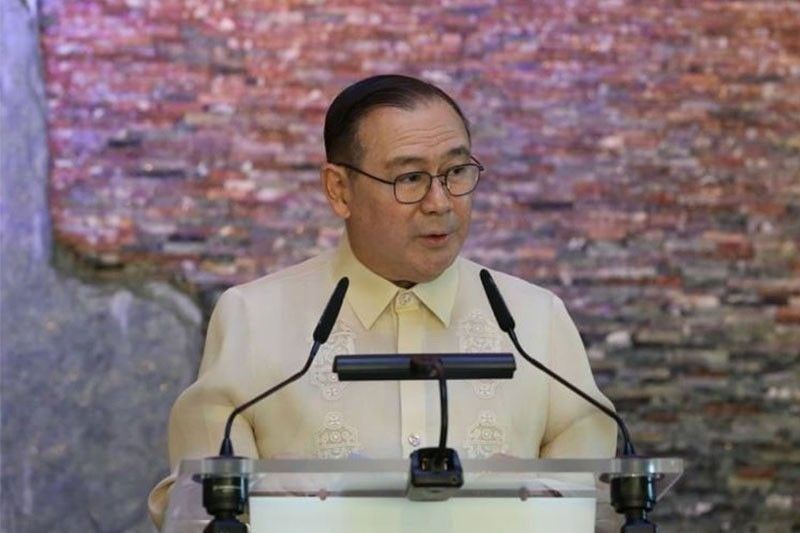Locsin laments Aussies won’t back Philippines nominee to UNCLOS body

MANILA, Philippines — For not supporting the Philippines’ candidate to the Commission on the Limits of the Continental Shelf (CLCS), Foreign Affairs Secretary Teodoro Locsin Jr. said yesterday he was “extremely disappointed” with Australia, which he thought was the country’s partner in upholding rules-based order in the maritime domain.
“I am extremely disappointed Australia cannot support our candidature to the CLCS,” Locsin said, referring to an expert body established by the 1982 United Nations Convention on the Law of the Sea (UNCLOS).
Locsin’s remark was posted on the Department of Foreign Affairs’ Twitter account.
The Philippines nominated an expert on the technical aspects of the law of the sea and maritime delineation, the Philippine Mission to the United Nations in New York said.
In a tweet Monday, the mission described Efren Carandang as “its foremost expert in maritime delineation… As technical expert from a developing coastal state with experience as a transformative leader in @namriagovph, his election could provide a boost to the CLCS.”
Carandang serves as deputy administrator of the National Mapping and Resource Information Authority.
Australia, Locsin said, did not support the Philippines despite his support for the trilateral security partnership AUKUS – Austalia, the United Kingdom and the United States.
“Stuck out my neck for AUKUS. Thought we were partners in upholding rules-based order in the maritime domain. Come through for us,” Locsin said.
In September 2021, the Philippines expressed support for the establishment of an enhanced trilateral security alliance AUKUS to work together to safeguard peace and stability in the Indo-Pacific and boost security deterrence against China in the region.
“The Philippines welcomes Australia’s decision to establish an enhanced trilateral security partnership with the United States primarily and the United Kingdom,” Locsin said in a statement.
The secretary noted that the security pact formed by the three countries will further enhance Australia’s military capacity, noting its proximity in Southeast Asia to respond quickly to threats and challenges in the region.
Under AUKUS, the three nations will focus immediately on identifying the optimal pathway to deliver at least eight nuclear-powered submarines for Australia.
The nuclear submarine deal with Australia drew criticism from allies amid fears of conflict.
As an archipelagic and maritime country that upholds the UNCLOS and the institutions that implement it, the Philippines is committed to supporting the CLCS in the pursuit of its mandate, the Philippine mission said.
Deputy Assistant Secretary Maria Elena Maningat said “the Philippines is steadfast in its resolve to work with other States Parties to revitalize CLCS and address challenges such as rising backlogs in pending submissions.”
The CLCS consists of 21 members, elected by those states that are party to the Convention. Members are experts in geology, geophysics or hydrography and serve in their personal capacities.
The Commission examines coastal states’ submissions on which it makes recommendations. Its mandate also includes providing scientific and technical advice, if requested by a coastal state.
The Philippines also supports the Trust Fund for CLCS members.
In a tweet on Monday, Locsin said the Philippines must take the lead because of its maritime features.
“The best in the field where the Philippines – because of its maritime features – must take the lead. The rest are inland states of trivial significance or continental ones posing maritime threats proved by provocative actions. The Philippines under PRRD (President Duterte) countered them all,” Locsin said following the nomination of Carandang as the Philippines’ candidate in the CLCS for the Term 2023-2028.
Carandang, one of the Philippines’ foremost authorities on the technical aspects of the law of the sea, has extensive experience in hydrography and its ramifications in international maritime law.
The country’s candidate advocates for the full and consistent application of international law including the UNCLOS, particularly on the determination of maritime entitlements, delineation of maritime zones and delimitation of international maritime boundaries.
He supports both bilateral and multilateral cooperation as a means to manage maritime disputes and address other concerns such as navigational safety and marine environment protection.
- Latest
- Trending






























